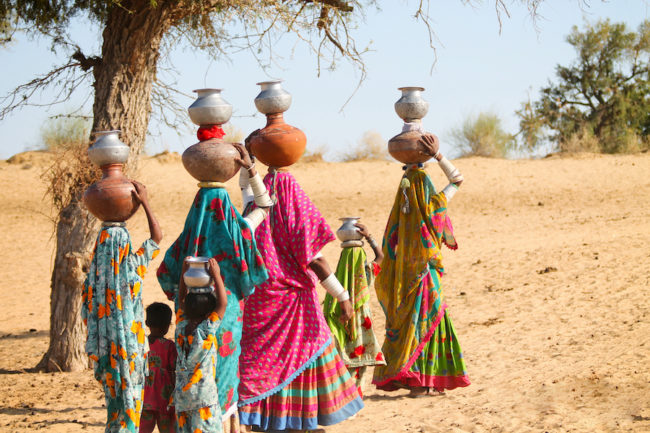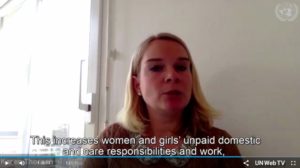MMM joins the call for the recognition of the right to a safe, clean, healthy and sustainable environment
05.03.21
UN Geneva, Human Rights Council - MMM oral statement also drew attention to the specific vulnerabilities of women and children to water scarcity and water pollution, the focus of the latest report of the UN Special rapporteur on human rights and the Environment.

According to WHO, only 71% of the global population use a ‘safely managed drinking-water service – one that is located on premises, available when needed, and free from contamination. A staggering 2 billion people’s right to clean water and sanitation is not satisfied.
This situation has a greater impact on women and children.
- It puts at significant risk the health and even the lives of new mothers and their babies.
- When they are not sick themselves, women are the ones who care for children and other dependents suffering from water-related diseases.
- They are also mostly responsible for fetching water, carrying heavy loads over long distances to the detriment of their health and safety.
This increases women and girls’ unpaid domestic and care responsibilities and work, reducing their ability to pursue education, generate an income or participate in public life.
Environmental degradation only makes things worse, including gender inequalities.
Water is the basis of both human and other forms of life upon which we depend for survival.
We therefore join the call for the universal recognition of the right to a safe, clean, healthy and sustainable environment. #TheTimeIsNow

Karen Thorsen, MMM representative at the United Nations in Geneva, delivered the Statement at the 46th session of the Human Rights Council during the interactive dialog which followed the presentation by the UN Special Rapporteur on Human Rights and the Environment of his report on the impact of water scarcity, water pollution and water-related disasters.
- MMM is a signatory of the call for the global recognition of the right to a healthy environment, launched by the governments of Costa Rica, Maldives, Morocco, Slovenia and Switzerland during this Human Rights Council.
- MMM also co-sponsored the statement delivered by Child Rights Connect Working Group on child rights and the environment and the Children’s Environmental Rights Initiative at that same session with the Special Rapporteur also calling for the formal recognition by the of this Right, which is essential for the realisation of children rights.
The New EU Gender Equality Roadmap : A Call for Inclusion of Mothers
04.03.25
The European Commission’s initiative on a new Gender Equality Roadmap post-2025, marks a significant step forward in addressing gender disparities across the European Union. Make Mothers Matter (MMM
Breaking the Cycle: Gender Equality as a Path to Better Mental Health
18.03.25
The Council of the European Union has taken a decisive step in recognising the vital connection between gender equality and mental health.
Europe Must Listen to Mothers: Our landmark report heads to the European Parliament
28.08.25
On 22 September 2025, the voices of mothers will take centre stage in Brussels. For the first time, Make Mothers Matter (MMM) will present its State of Motherhood in Europe








